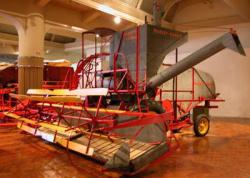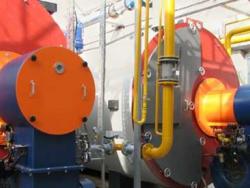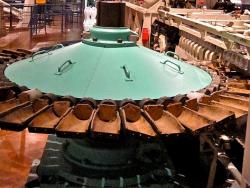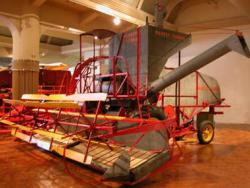Ackley Bridge is an excellent example of a multiple kingpost truss and a noteworthy early example of covered bridge preservation efforts in the United States. Built in 1832 by Joshua Ackley (b.1805) and Daniel Clouse (b.1812), Ackley Bridge originally spanned Enslow’s Branch of Wheeling Creek between Greene County and Washington County in Pennsylvania, where it carried traffic for over a century.
48124

Designated A Historic Landmark Of Agricultural Engineering The Massey-Harris No. 20 was the First Commercially- Successful Self-Propelled Combine Used to Harvest Small Grains Under a Wide Variety of Conditions, World-Wide. Engineered By Thomas Carroll, Chief Engineer, Aided by Robert Ashton and Albert Luke, Principal Assistants, it was First Marketed in 1938 by the Massey-Harris Company. This Combine Opened a New Era an Farm Mechanization and Revolutionized the Grain Harvesting Process. Forty-Four Years Later, This Same Harvesting Principle Continues to be Used Throughout the World.

This dynamo, connected directly to a high-speed steam engine, was one of six that produced direct current at Thomas A. Edison's electric power station at 257 Pearl Street in New York City. The Pearl Street Station was the prototype for central station power generation. Edison set out in 1878 to provide an electrical distribution system to bring lighting into the home: His first filament lamp lit on October 21, 1879. With the help of Frances Upton and C.L. Clarke, Edison built his engine-driven dynamo for the 1881 Paris Electrical Exposition.


Published in 1914-15, the ASME Boiler and Pressure Vessel Code (BPVC) was the first comprehensive standard for the design, construction, inspection, and testing of boilers and pressure vessels. With adoption in the United States and use in many countries, it has contributed significantly to public safety and influenced the continued development of boiler and pressure vessel technology.
This machine, which began operation on December 15, 1891, for the New York Edison Illuminating Company, represents the beginning of large-scale electric power generation in the United States. The generator was designed by chief engineer John Van Vleck, David Joy (known in England for his valve gear), and S. F. Prest.
Innovations
This machine, which began operation on December 15, 1891, for the New York Edison Illuminating Company, represents the beginning of large-scale electric power generation in the United States. The generator was designed by chief engineer John Van Vleck, David Joy (known in England for his valve…
Read More
Published in 1914-15, the ASME Boiler and Pressure Vessel Code (BPVC) was the first comprehensive standard for the design, construction, inspection, and testing of boilers and pressure vessels. With adoption in the United States and use in many countries, it has contributed significantly to…
Read More

This dynamo, connected directly to a high-speed steam engine, was one of six that produced direct current at Thomas A. Edison's electric power station at 257 Pearl Street in New York City. The Pearl Street Station was the prototype for central station power generation. Edison set out in 1878 to…
Read More
Designated A Historic Landmark Of Agricultural Engineering The Massey-Harris No. 20 was the First Commercially- Successful Self-Propelled Combine Used to Harvest Small Grains Under a Wide Variety of Conditions, World-Wide. Engineered By Thomas Carroll, Chief Engineer, Aided by Robert…
Read MoreAckley Bridge is an excellent example of a multiple kingpost truss and a noteworthy early example of covered bridge preservation efforts in the United States. Built in 1832 by Joshua Ackley (b.1805) and Daniel Clouse (b.1812), Ackley Bridge originally spanned Enslow’s Branch of Wheeling Creek…
Read More

